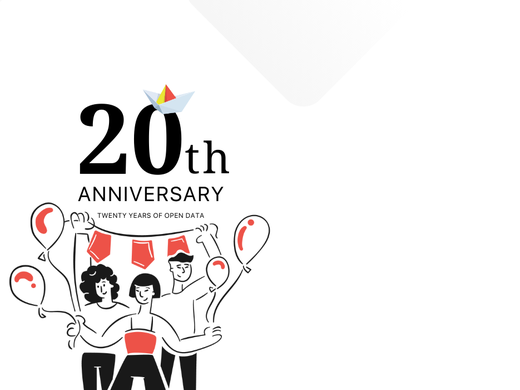Introduction
In the modern world, where data grows and evolves at an unprecedented pace, the importance of adaptability and flexibility in data management cannot be overstated. Our ability to effectively manage and utilize this wealth of information hinges on embracing these principles. As we confront an ever-changing digital landscape, the tools and platforms we rely on must not only be robust but also agile, capable of evolving in tandem with our needs. In this context, adaptability and flexibility are not just features – they are the cornerstones of modern data management, vital to unlocking the full potential of the data that surrounds us.
In this article…
This article delves into CKAN's transition from being solely dependent on the SOLR search engine, a shift driven by the need for greater scalability and user accessibility. We explore the move towards a modular CKAN architecture, enabling the integration of various search engines and thus broadening the platform's capabilities. This change, reflecting a puzzle-like integration, empowers users with diverse technical backgrounds to choose the search engine that best suits their needs, thereby enhancing CKAN's flexibility, functionality, and user experience.
Want more technical details?
For those interested in the nitty-gritty technical details, including the development of an interface layer, a customized plugin system, and the adaptations in data indexing and query languages, check out the analyses provided by Dragan Avramovic at the end of this article.
Why Change? Why Now?
Challenges with SOLR-Dependent CKAN
CKAN has traditionally been wedded to the SOLR search engine. SOLR, despite its power and flexibility, demands specific expertise for configuration and management. Its complex query syntax poses a barrier to some users. This dependency potentially curbs CKAN's scalability and adaptability.
The Case for a Modular CKAN
Recognizing the need for versatility, we’ve been discussing the possibility of having a modular CKAN architecture capable of accommodating various search engines beyond SOLR. This modular design, reminiscent of interlocking puzzle pieces, will allow for seamless integration with different search engines. While this change might sound complex, it’s essentially about enhancing CKAN’s adaptability.
Advantages of a Modular Approach
A modular CKAN would allow for the integration of different search engines, enhancing flexibility and functionality. Users gain the freedom to select a search engine that best fits their project's needs, fostering an ecosystem where various engines coexist and complement each other. This flexibility means that users with varying technical backgrounds can choose a search engine that aligns with their comfort level and project needs. Want to dive deeper into the technical details? Check out Making CKAN Modular to Accommodate Various Search Engines in Place of SOLR.
The Beauty of Flexibility
Imagine CKAN as an expansive digital landscape, a realm of endless data. Until now, navigation through this terrain was guided by a single, albeit powerful, compass – the SOLR search engine. The introduction of multiple 'search methods' transforms this journey, akin to equipping explorers with an array of sophisticated navigational tools. Each tool, or search engine, is finely tuned to traverse different terrains of data, making discovery more intuitive and tailored to individual needs and expertise. This initiative not only enriches the user experience but also capitalizes on the diverse technological landscapes of search engines, inviting broader community engagement and fostering a culture of continuous enhancement and innovation within CKAN.
Technical Implementation
The proposed modularity involves more than just a simple swap of tools. It's about architecting CKAN with modularity at its core, enabling seamless integration with different search engines. Key steps include:
- Creating an Interface Layer: This acts as a bridge, allowing CKAN to interact with any search engine through a standard API.
- Developing a Plugin System: This system empowers developers to craft custom search engine plugins, ensuring that CKAN's versatility is only limited by the community's imagination.
- Adapting Data Indexing and Query Languages: Different engines mean modifications in data indexing strategies, query language abstraction, and data migration support. CKAN's approach involves abstracting these complexities, making the transition smooth for its users.
Approaches to Integration
Two main approaches are considered: using a client library for communication with the search engine and implementing the search engine as a separate microservice, possibly via a REST API server. After careful consideration, we've decided to proceed with the first approach, utilizing a client library for effective communication with the search engine. This decision, along with a more detailed explanation and insights, can be further explored in Dragan’s analysis here: Enabling the Integration of Different Search Engines with CKAN.
Understanding the Technical Nuances
For those with foundational technical knowledge, this transition offers a deeper understanding and control over data search and indexing strategies. Solr and Elasticsearch, while both powerful, use different query languages and approaches to data handling. It’s like switching from one programming language to another, each with its own syntax but ultimately serving the same purpose. For instance, basic text searches, result filtering, sorting, and pagination are handled differently in both systems. This understanding is crucial for adapting queries and indexing strategies. Keeping in mind the importance of backward compatibility, the Solr DQL currently utilized in CKAN will remain unchanged. For technical details, see Mapping Solr and ElasticSearch DQL parameters.
Conclusion
In a data-driven world, the evolution of CKAN to support various search engines is not just an enhancement but a strategic necessity. This move promises to boost CKAN's adaptability, flexibility, and innovation potential. While the transition poses technical challenges and requires a significant effort in development and testing, the benefits of a more versatile and robust CKAN platform are far-reaching and transformative.
Embracing this change positions CKAN at the forefront of data management solutions, ready to meet the diverse and evolving needs of its global user base.
Want to dive deeper into the technicalities?
Check out Dragan’s articles below:


